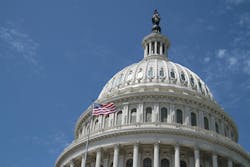Congress’s Megabill Would Raise Energy Costs, Strain Electric Grid
WASHINGTON — A sweeping tax and domestic policy bill passed by the U.S. Senate on July 1 would terminate numerous major energy efficiency programs and incentives, raising costs for families and businesses while increasing strain on the electric grid, according to the American Council for an Energy-Efficient Economy (ACEEE).
“The bill will raise energy costs and make it harder to keep the lights on,” said Steven Nadel, executive director of ACEEE. “No one asked Congress to make their energy bills even higher. Taking away incentives for energy-saving improvements would raise monthly bills for families and businesses. It will only exacerbate the growing strain on the electric grid. And the bill goes out of its way to encourage automakers to produce inefficient cars that are costly to fuel.”
The bill would eliminate tax credits supporting energy efficiency, including:
- The Energy Efficient Home Improvement (25C) credit, which helps homeowners make improvements such as installing insulation or highly efficient heating and cooling systems. Millions of households have used the credit, which ACEEE estimates helps save an average of $130 a year. The bill would terminate the credit after 2025.
- The New Energy Efficient Home (45L) credit, which incentivizes builders to construct energy-efficient new houses and apartments. ACEEE estimates that the credit will help build more than three million qualifying homes, saving homebuyers an average of $450 in energy costs annually. The bill would terminate the credit after June 2026.
- The Energy Efficient Commercial Buildings Deduction (179D), which incentivizes owners of commercial and large multifamily buildings to make energy efficiency upgrades and provides incentives for the construction of efficient new ones. The bill would terminate the credit after June 2026.
- The Commercial Clean Vehicle (45W) credit, which helps businesses purchase electric trucks and cars, spurring the commercialization of innovative, clean, efficient electric drivetrains in trucks and other large vehicles, and lowers their total operating costs. The bill would terminate the credit after September 2025.
- The New Clean Vehicle (30D) credit, which helps individuals purchase new electric cars, the Used Clean Vehicle (25E) credit, which helps individuals purchase used electric cars, and the Alternative Fuel Vehicle Refueling Property (30C) credit, which supports the installation of electric chargers. Electric vehicles reduce volatile gasoline costs and air pollution. The bill would terminate the vehicle credits after September 2025 and the charger credit after June 2026.
The bill would slow the transition to more efficient vehicles by:
- In addition to ending the vehicle credits, removing any penalty for car and truck companies violating fuel economy standards, encouraging them to make vehicles that waste more fuel.
The bill would also rescind funds that have not already been contracted for energy efficiency programs created or expanded by the Inflation Reduction Act, including:
- The Greenhouse Gas Reduction Fund, which provides financial and technical assistance for projects to reduce or avoid greenhouse gas emissions and other forms of air pollution, with funded projects primarily in low-income and disadvantaged communities. The bill would entirely terminate the authorization for this program.
- The Green and Resilient Retrofit Program, a grant and loan program for affordable apartments to reduce energy use and bills and improve air quality, sustainability, and resilience, including with energy and water efficiency, solar power, energy storage, and building electrification.
- Environmental justice grants and assistance for work by community-based organizations.
- The Industrial Demonstrations Program, which provides federal cost-sharing for new, competitive technologies in the cement, iron and steel, aluminum, chemicals, and other industrial sectors.
- Climate Pollution Reduction Grants for states, local governments, tribes, and territories to develop and implement plans to reduce greenhouse gas emissions and other harmful air pollution.
- The Loan Programs Office, which provides financing for innovative energy projects that reduce greenhouse gas emissions.
For more information, visit www.aceee.org.
